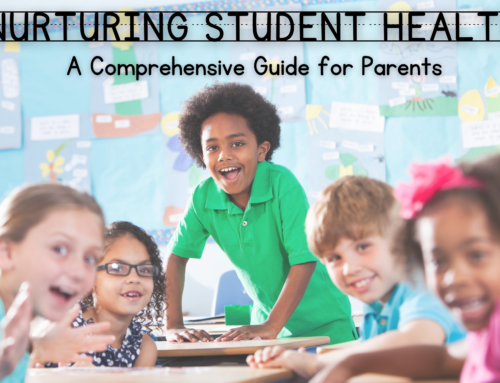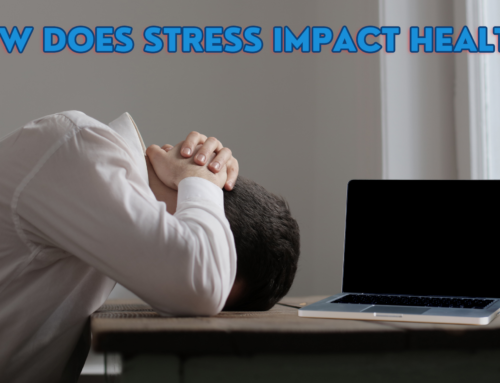
No matter what time of year it is, you go through a period of constant sniffling, sneezing, and coughing. Could you really have seasonal allergies in the fall? Is it allergies or sickness?
Sometimes, it can be tough to tell the difference between the two. Colds and other viral infections can be mild enough that you think it’s just allergies.
On the other hand, seasonal allergies, also known as hay fever, can make you feel bad enough that you might think you’re sick.
So, how do you know which it is? What could be causing these symptoms periodically throughout the year? If you’re like many people, you might not fully understand what allergies are and why they cause such uncomfortable symptoms.
A Brief Explanation of Allergies
An allergic reaction occurs when your immune system encounters a substance it believes to be harmful to your health. When it’s detected, your body overreacts and sends antibodies to attack it. During this process, you release chemicals usually used to destroy microorganisms.
The most common chemical during an allergic reaction is histamine, which can cause redness, itching, and swelling of the affected area. Antihistamines, such as Benedryl, counteract this chemical.
Substances that can lead to allergic reactions include pollens, mold, pet dander, foods, medicines, insect stings or bites, and much more.
Your body reacts in various ways depending on the allergen, how you came into contact with it, and your immune system.
There are many different ways you may react to allergens. These include:
- Sneezing
- Coughing
- Sniffling and runny nose
- Congestion
- Wheezing or difficulty breathing
- Itchy, dry, or watering eyes
- Swollen tongue
- Red, swollen, and itchy skin
- Hives
- Nausea, vomiting, or diarrhea
- Dizziness or feeling lightheaded
Allergic reactions can range from mildly annoying to potentially life-threatening.
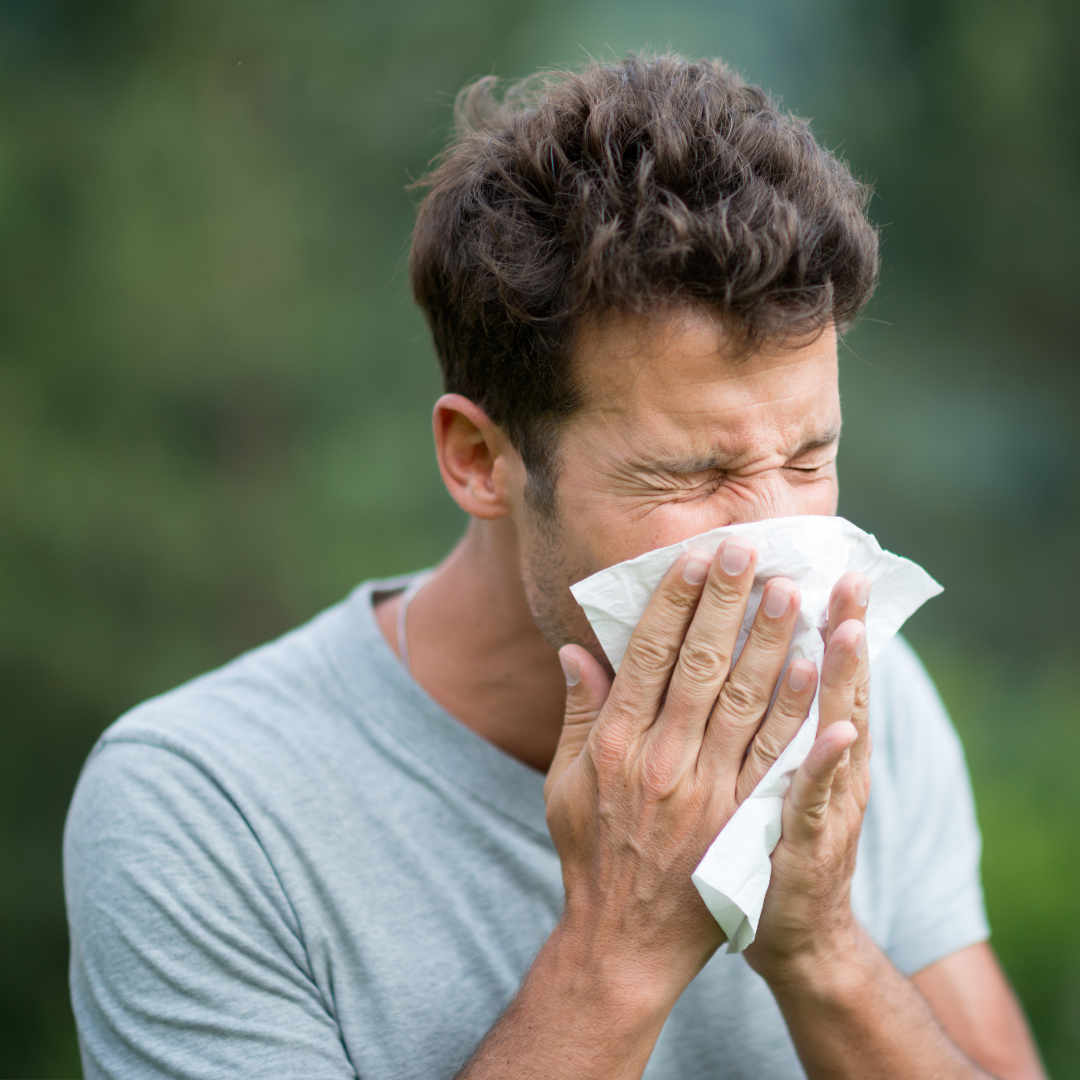
Anaphylaxis
The most severe allergic reaction is anaphylaxis or anaphylactic shock. This occurs when the immune system critically overreacts to an allergen, causing a flood of chemicals that make your body go into shock. Within minutes, blood pressure drops, tissues swell, and airways narrow, causing suffocation.
If not treated immediately, anaphylaxis can be quickly fatal.
While seasonal allergies rarely cause anaphylactic shock, any allergen can lead to this terrifying condition. Warning signs include a rapid, weak pulse, nausea and vomiting, sudden swelling, a skin rash, and difficulty breathing.
The only treatment for anaphylaxis is an epinephrine injection, commonly called an EpiPen. People with severe allergies, especially to certain foods, medicines, insect stings, and latex, are typically aware of this danger and carry one with them.
However, though not common, anaphylaxis can happen to anybody. If you or someone you know suddenly experiences any of the above symptoms, stay calm and call 9-1-1 immediately. Even if you treat yourself with an EpiPen, you still need to go to the ER in case the reaction comes back.
Fortunately, most people never go through this, especially from seasonal allergies. But if you have asthma, a history of anaphylaxis, or known allergies to specific substances, you must understand what it is and what to do about it.
Seasonal Allergies Throughout the Year
Most people assume allergies only affect them during the spring when everything is blooming and growing.
Unfortunately, each season has higher concentrations of common allergens, even in winter.
Seasonal allergies only overlap a little in some areas with more distinguishable seasons. But in hotter climates, such as Texas, trees, weeds, and grasses produce pollen almost year-round. For allergy sufferers, this means that they won’t catch a break for most of the year.
On the plus side, most people are only allergic to specific pollens. Allergy testing can pinpoint what affects you. This handy seasonal allergy chart from the Asthma and Allergy Center of Texas shows which pollens are more common each month.
The downside is that even when pollens aren’t widely circulating, there are still common allergens that can lead to symptoms year-round no matter what part of the country you live in.
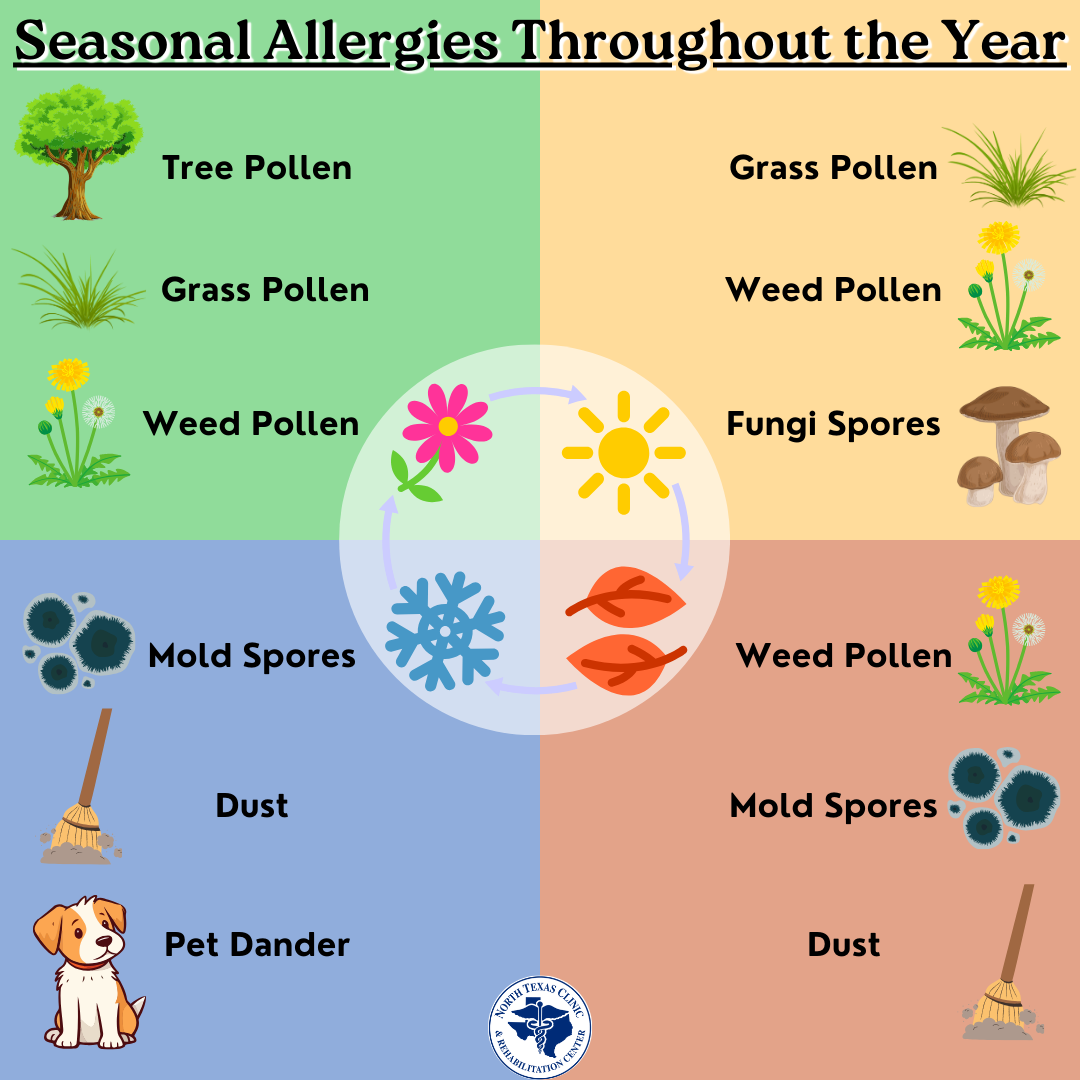
Information gathered from zyrtec.com
Spring
You might think all those beautiful spring flowers are causing your constant sniffles. But actually, the most prominent allergen is tree pollen.
Even if you don’t live in a densely forested area, wind can carry tree pollen for dozens and even hundreds of miles. Common Texas trees that cause the most widespread allergies include Cottonwood, Cedar, Elm, and Pecan.
Other bothersome allergens come from newly growing grasses and weeds, but these typically don’t become a problem until late spring here.
Summer
The pollens from most trees start to diminish during the summer as weeds and grasses take over. Bermuda grass and plantain, ragweed, and sagebrush weeds are particularly bothersome.
The heat and humidity of summer are also the perfect combination for the growth of fungi and molds. These produce spores that, like pollen, cause allergy symptoms for many people.
Fall
While most pollens start dissipating in the fall, ragweed and cedar tend to be more or less year-round offenders in different parts of the country. In Texas, ragweed ramps up in late summer and early fall, and cedar wakes up from its summer slumber during late fall, winter, and spring.
Mold spores also become a bigger problem as they develop under wet, fallen leaves.
Winter
Other than cedar, most pollens and outdoor spores are dormant during winter, even in Texas.
However, cooler temperatures lead to most people spending more time indoors. Perennial allergens, such as dust, mold inside homes, and pet dander, cause more allergic reactions during the winter.
One way to help alleviate indoor allergies is to clean your vents and maintain your HVAC system. Regular vacuuming, sweeping, and dusting also decrease symptoms, especially if you have pets.
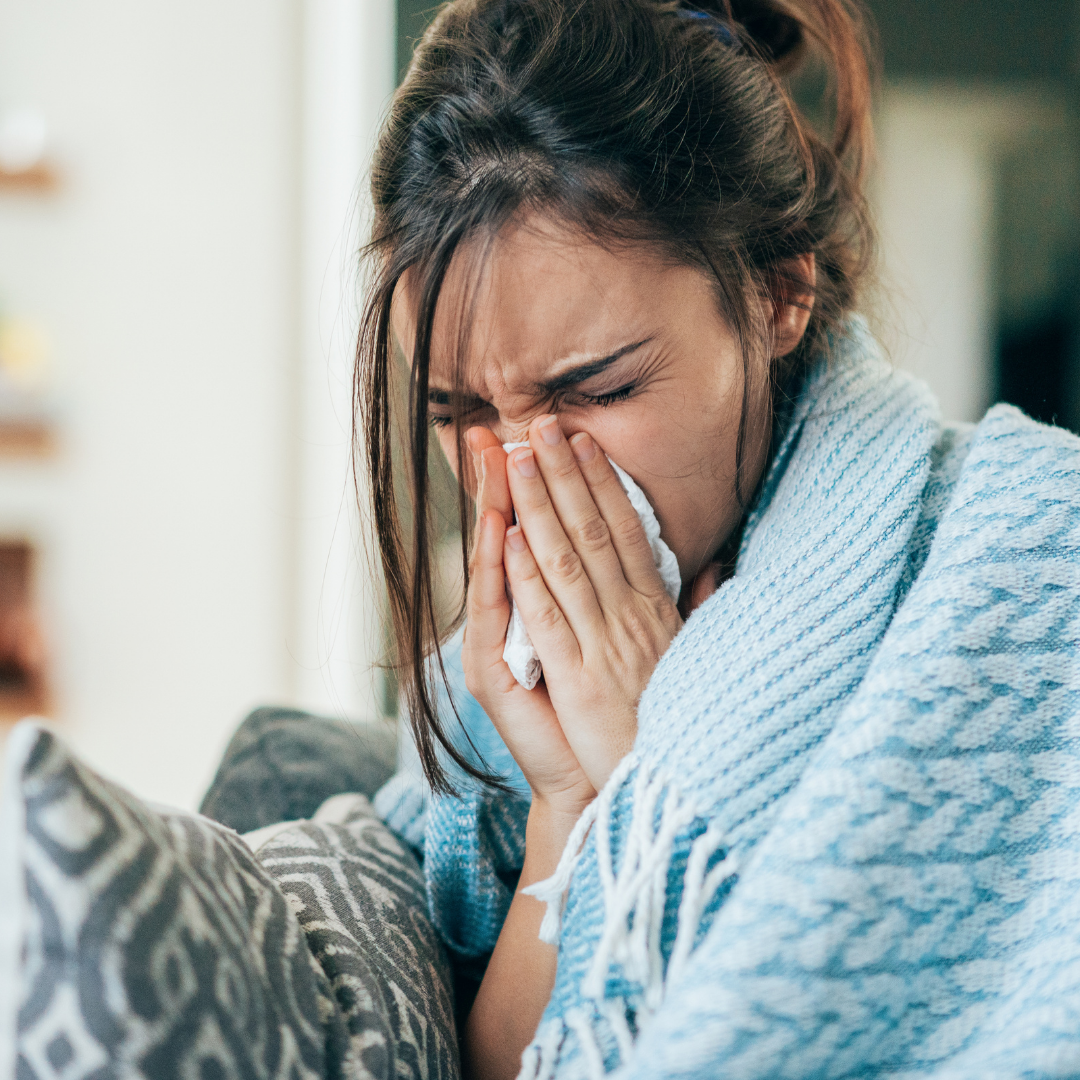
Differences Between Seasonal Allergies and Sickness
You might have noticed that hay fever and colds have a lot in common in how they make you feel.
Sneezing, runny nose, and coughing are common allergy and respiratory illness symptoms. How can you tell the difference between the two?
The first indicator is a fever. Allergies don’t cause fevers, but viral injections often do.
The second is your mucus. Large amounts of thick, discolored mucus are a sign of infection. Yes, allergies can cause a shocking amount of drainage. But it will be thinner and more clear.
The third is when you feel bad and for how long.
Colds, the flu, and other respiratory viruses typically go away within one to two weeks, sometimes even quicker. In comparison, allergy symptoms can last for months at a time or only for a few hours.
That time span also leads to when you get sick. If you’ve recently had contact with a sick person or have been among a large crowd, you probably caught a virus.
On the other hand, maybe you’re sniffly even though you haven’t been around many people. If pollen counts are high or you’re exposed to dust or dander, you’re likely suffering from allergies.
The fourth is more subjective. Mild allergy symptoms typically don’t cause you to feel run down or achy. Viral injections, however, make you feel generally sick. That said, those with asthma and severe allergies can certainly feel drained during particular seasons. Or, there may be other factors causing exhaustion or weakness. So, this may not always be a good indicator.
As a last resort, medicines could point to a general diagnosis. When allergy medicines clear up your nose but you still feel rotten, you probably have more going on than seasonal allergies.
Important Reminders!
First, just because your allergies are acting up doesn’t mean you aren’t sick too. Both things can occur at the same time.
Second, never take more medicines than you need, especially just to figure out what is wrong with you. Cold and flu medicines have multiple medications that should only be taken when you have many symptoms. Otherwise, treat single symptoms individually to avoid overmedicating. For example, treat:
- Eye allergies with special eye drops,
- A congested nose with nose spray,
- An allergic rash with a topical cream,
- And seasonal allergy attacks with antihistamines.
Lastly, if you’re feeling unwell and don’t know why, visit your healthcare provider for a proper diagnosis, medication prescriptions, and self-care recommendations.

When to See a Doctor
For most of us, treating a cold or dealing with allergies doesn’t require a doctor’s visit. But sometimes, when you feel bad enough or nothing is helping, it might be time to make an appointment.
Symptomatic Reasons to Visit Your Healthcare Provider
Whether you think it’s seasonal allergies or sickness, you or your family member should see a healthcare provider for these symptoms:
- Any symptoms that last longer than 10 days
- A fever above 101° lasting longer than 2 days
- Ear or head pain that doesn’t respond to medication
- Difficulty swallowing
- Chest pain or difficulty breathing
- Can’t keep foods or fluids down
Even for otherwise healthy adults, these are indications that whatever is causing these symptoms shouldn’t be left to go away on its own. It’s even more important to make an appointment for children, older adults, and those with compromised immune systems.
Seek emergency care if you or your loved one has a significant headache with a stiff neck, fever, and/or trouble breathing. You should also see a doctor immediately for fevers above 105°, if you’re showing signs of dehydration, cannot breathe sufficiently, are confused, have trouble with balance, or are losing consciousness.
These symptoms could point to a severe infection, such as pneumonia, meningitis, or septicemia, that requires immediate medical treatment. These types of conditions, if left untreated, can quickly lead to death.
Some of these could also be asthma symptoms, even without a prior history or diagnosis. Although asthma is prevalent and generally easy to treat, having a proper diagnosis, treatment plan, and medications is vital and could be life-saving.
When to Get Allergy Testing
If allergies cause these symptoms, you should consider visiting your healthcare provider to get allergy testing. (We offer allergy testing here at North Texas Clinic and Rehab.) These skin tests will pinpoint what your immune system is reacting to. Knowing your allergens helps you prepare for, treat, or avoid them.
The choice to get tested for seasonal allergies depends on how much your allergies affect your daily life. However, a severe allergic reaction means it is imperative to get tested to determine what caused them. These reactions include anaphylaxis, swelling in the lips, face, or tongue, or hives over a large area.
Once your doctor has uncovered the specific allergen(s), they can help you learn how to avoid them. They’ll also prescribe an EpiPen to keep with you if you come into contact with those substances again.

Caring for Seasonal Allergies or Sickness
Whether it’s seasonal allergies or sickness, the most important thing you can do is take care of yourself.
You know your body better than anybody. Pushing yourself past the limits of how you feel will only make recovery longer and harder. So, when you’re sick, take the time to rest and treat your symptoms.
If you don’t start feeling better through over-the-counter medicines, tried and true remedies, and time, visit your healthcare provider. You may need testing and professional medical treatment, especially for infections and other sicknesses.
They may be annoying and uncomfortable, but seasonal allergies are very common. If you haven’t found what works for you, don’t continue suffering alone. Talk to your healthcare provider to figure out a treatment plan so that you know your triggers and can prepare for allergy season.
It may take a little time, but staying healthy and breathing easy all year is worth it.



